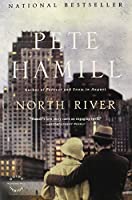
James Delaney is a 47-year-old doctor practicing in Depression-era New York, living alone in a house gifted him by a grateful patient. He had returned from the trenches of the Great War where he was a medic to find his parents dead from the flu, his wife furious at his desertion of them, and his daughter wary of the stranger he’d become. Now they have all left him, his wife first, simply walking away one day so that most people thought she’d thrown herself in the river, and then Grace, marrying a Mexican revolutionary and disappearing with him.
All Delaney has left is his work and, after the carnage of the war, he is determined to save what lives he can and comfort the dying as best he can. Then one morning he returns from the hospital to find a baby in the entryway with a note from Grace asking him to care for her two-year-old son Carlos while she goes in search of her husband. Recognising that with his work he cannot care for a small child alone, he enlists the help of Angela, who owns the local restaurant where he usually has dinner. She sends Rose, a Sicilian woman, to live with them and care for Carlito as he is known.
This incident is but one of the many that show the interconnected webs that support city life, something that I have thought about often. Cities are said to be impersonal, and they are, but we humans find and create our networks just the same.
This is the novel I’ve been wanting to read. None of these modernist games of “I’m using my real name and much of my real life, but much is fiction, and it’s up to you to guess what’s real and what’s not, and oh by the way what is reality?” No bouncing between multiple protagonists. For once, I could simply relax into the life of single person, one who is complicated and flawed but whose basic moral code is evident.
Blake Snyder, author of Save the Cat, says, “Readers connect when they are able to make immediate, positive moral judgments about characters. Generally the characters who are the most universally appealing demonstrate heart values.”
Despite his near poverty, Delaney continues his work among his neighbors in the poorer parts of town, where he has chosen to remain. Even when they can’t pay him. Even when he sees the same problems over and over, such as men getting drunk and beating their wives. The neighborhood, like the city is caught between opposing gangs, part gangsters and part politicians. His own father had been a powerful leader in Tammany Hall, and Delaney is well aware of both the good and the not-so-good done by Tammany, so he has a complicated relationship with the gangs who both threaten and need him. Indeed, the leader of one served with him in France.
Beyond the brilliantly realised characters, Hamill recreates the world of Depression-era New York in all its vibrancy and squalor and beauty. Whether it’s the mayhem of the annual St. Patrick’s Day parade when the Irish immigrants march down Fifth Avenue to remind the rich that they need the Irish votes, or a visit to the Met to see the Botticelli exhibit where Delany and Rose have to drag Carlito away from the armor only to have Delaney himself mesmerised by the Primavera, Hamill conjures the scene so expertly that my own experiences are summoned and swell my emotional response.
The story is engaging too because it moves quickly from scene to scene, with little narration in between. When we do get a moment of reflection it is all the more meaningful for its rarity. This moment comes early in the book and captures the isolation that Rose and Carlito begin to heal.
There were too many people to ever know them all. Everyone has a story that he’d never hear, and he had heard more stories of human grief than most people. He met them in the present, but each of them had a past. Better to shut down, stop imagining, deal with all other human beings the way he dealt with patients. Cage the past. Deal with them, gently if necessary, and then seal them out of memory. They could vanish like the words of a song, recovered only in isolated fragments. Worry about your friends, he often thought, and the few people you love, and leave the rest to Providence . . .
In helping novelists understand how to create a story that will break out into popular acclaim, literary agent and writing guru Donald Maass says, “A breakout novelist needs courage, too: the courage to say something passionately. A breakout novelist believes that what she has to say is not just worth saying, but it is something that must be said. It is a truth that the world needs to hear, an insight without which we would find ourselves diminished.”
And that is what I found here: a truth about navigating this perilous world with its wounds and compromises, about love and work and family.
What novel have you read recently that satisfied a need you didn’t know you felt?
